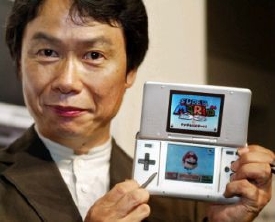Opinion: Mobile needs less cash and more creatives
Where's our Miyamoto? Our George Lucas? Our Grand Theft Auto?

One of the things that makes video games such an interesting medium is that no matter how big the pursuit gets every year, it's still young enough for the individuals who set it in motion to be around today.
To recite just a fraction of the roll call, in the mid '80s Archer McLean made important contributions to the success of the Atari 800 and the C64, and you can still read his views in magazines like Retro Gamer. Eccentric entrepreneur Nolan Bushnell created Atari all the way back in 1972, and after decades of wealth-buffeting vicissitudes he's still asserting his presence on the games industry with his uWink media bistros, where customers can order food and play games with touchscreen menus. Thanks Nolan.
 Like rocket scientists at a shuttle launch, you can almost imagine these nerd-savant programmers huddled in the industry's mission control, collectively overseeing their creation as it thunders through the commercial and artistic strata.
Like rocket scientists at a shuttle launch, you can almost imagine these nerd-savant programmers huddled in the industry's mission control, collectively overseeing their creation as it thunders through the commercial and artistic strata.
Game designer virtuoso and living legend Shigeru Miyamoto – described by Edge in 1995 as the 'Stephen Spielberg of video games' – created Donkey Kong in 1981, and he continues to be so central to Nintendo's creative identity that it's literally impossible for them to pay him too much. And, perhaps most significantly for us pocket gamers, there's Trip Hawkins, who left Apple in 1982 to found Electronic Arts, founded Digital Chocolate in 2003, and is now a de facto prince of mobile gaming.
It's easy to be complacent. Just as people in their middle years don't know how lucky they are to have been around when The Beatles were still recording, we could be forgiven for letting all this pass us by. But it's worth remembering that we live, as gamers, in interesting times.
A problem like mobile gamingWriting about mobile games can be a frustrating experience. Once, whilst working for a company that sold mobile games, I was instructed to write a press release announcing a commercial promotion. I fabricated a quote from my boss (an august and visionary individual), dressed it up as general optimism, and he tossed it like a thighbone to the press.
Within hours, the piece was on half a dozen sites. The mobile gaming industry is hungry for positive news, and it generally doesn't care who's giving it.
As a result you always have to take news with a pinch of salt, and the true picture is almost impossible to discern. A glance at the BBC's archive of mobile game-related headlines over the last few years reveals a rollercoaster of changing fortunes. Mobile gaming was 'set to explode' in 2003, 'expected to explode globally' in 2004, 'struggling uphill' in 2005, and 'taking a step forward' later that year.
However, putting these financial analyses aside, there's an experiment to help you gauge the success of the mobile games industry: Who do you know who really plays them?
Exactly.
So, what's the problem? Why are mobile games so overlooked as a medium? Why are people often vaguely surprised that they exist at all? Could it be the problem of control? How about the logistical nightmare of fragmentation, as developers struggle to make a single game function on a range of devices with wildly differing technical profiles? Could it simply be, as www.quicklybored.com argues in its tagline, that 'mobile gaming sucks'?
I don't think so. My girlfriend doesn't reach for the DS when she feels like playing a game. She reaches for the N70 and plays GlobalFun's Absolute Puzzle Deluxe until her eyelids tremble. We pass it back and forth, while the DS – glorious device that it is – gleams unopened on the dresser.
But, honestly: mobile gaming isn't yet as good as gaming on the PlayStation 2 or the DS. Tim Watson pointed out in his BBC coverage of 2006's GDC that there remain too many 'pale imitations of console games' and that's still true a year on.
Many games are great, though, and if mobile gaming can command the attention of both serious and casual gamers, it has every right to succeed.
Where is the love?How can the mobile games industry get there? It's making money, and a lot of it for some, but how can the platform establish itself amongst its more established console, PC, and handheld peers? We welcome your suggestions. For the time being, here is ours.
As Trip Hawkins lamented to Dean Takahashi after his 2007 GDC keynote speech, the mobile games industry at large is guilty of relying on retro titles and games based on established licenses. Inevitably, as has always been the case, games based on licences from outside the video game world tend on balance to be poorer.
Spending months developing an original title can be a risky business, and even if critics give such a game rave reviews, consumers are still reluctant to venture into untested waters. Slapping a superhero sprite into a half-baked hack, meanwhile, guarantees a certain minimum return.
 There are a few novel and ingenious titles available, such as the too famous exception that proves the rule, Skipping Stone (pictured) and correspondingly some novel and ingenious developers behind them, but too often mobile gaming is an industry with a gaping hole where its real key players – the game-makers – should be huddled, recognised and exulted as artists.
There are a few novel and ingenious titles available, such as the too famous exception that proves the rule, Skipping Stone (pictured) and correspondingly some novel and ingenious developers behind them, but too often mobile gaming is an industry with a gaping hole where its real key players – the game-makers – should be huddled, recognised and exulted as artists.
It's like this: Nintendo always wanted to make money because it's a business, but Miyamoto was born to make games. David Scheff argues in his book Game Over that doing so enabled Miyamoto to imaginatively revisit the forests and waterfall-caves he explored as a child.
 How much of this romantic account holds true is open to debate, but few who know anything about the subject would deny that Miyamoto is a visionary game-maker. The fertility of his creative vision allowed him to produce a series of masterpieces that, in turn, enabled Nintendo and the video game industry to flourish and profit.
How much of this romantic account holds true is open to debate, but few who know anything about the subject would deny that Miyamoto is a visionary game-maker. The fertility of his creative vision allowed him to produce a series of masterpieces that, in turn, enabled Nintendo and the video game industry to flourish and profit.
Mobile gaming, meanwhile, is often guilty of getting it the wrong way around, trying to smash into the wider video game industry and grab what it can before the critics arrive with their blaring sirens. It's too much about making money rather than making games, and the roses are so swamped in weeds that they struggle to be seen.
If you want to participate in the real growth of mobile gaming, follow our advice: read our reviews, ignore the cynical licenses (unless backed by great gameplay, of course), pick the roses and give great games the recognition they deserve.
To start us off: for Skipping Stone, Seung Hee Cho, we salute you.
